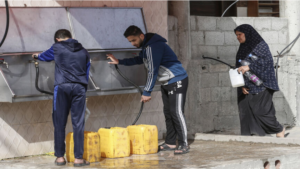Gazans fear worst after Hamas bans water wells

Collecting water at the Rafah refugee camp, southern Gaza Strip, 8 April 2021
Rasha Abou Jalal reports in Al-Monitor:
Palestinians living in the border areas of the Gaza Strip rely on wells to secure drinking water and to irrigate their crops, as the Hamas-run local municipalities fail to assume their responsibility to supply water to these areas.
In an August 25 statement, the Hamas-affiliated Water and Environment Quality Authority announced a ban against the digging of water wells in all Gaza governorates, under the pretext of fighting a severe decline in groundwater levels and quality due to over-exploitation of the aquifer into which the wells are drilled.
The authority said that its decision is based on the Palestinian Water Law No. 3 of 2002, which prohibits unlicensed drilling or exploration to obtain water, whether for public or private use. It stated that the violators are subject to legal accountability and penalties as stipulated by the Water Law. Article 35 of the law stipulates, “A prison sentence of not less than six months nor more than one year or a fine of not less than 1,000 [Jordanian] dinars [$1,410] and not more than 5,000 [Jordanian] dinars [$7,052] or its equivalent in local currency, shall be imposed [on the violators].”
The authority further called on all citizens who already drilled water wells to rectify their legal status in the next three months by obtaining a license to avoid legal accountability.
Gazans, however, believe this ban is only designed to obtain money in exchange for issuing licenses for drilling wells. Nabil Sultan, a resident of al-Ghawl border area in the northern Gaza Strip, told Al-Monitor, “I have been living in this area for seven years. The houses are not connected to the water supply or sewage network [of the local municipality], so we mainly rely on drilling wells to obtain water.”
Sultan was shocked when the ban was announced, saying, “The decision would mean that people will die of dehydration.” Rajab al-Tayeb, a farmer who owns three dunams (0.74 acres) of land in the border area to the east of Gaza City, relies mainly on wells to irrigate his crops.
He told Al-Monitor that the Water and Environment Quality Authority required him to pay 2,000 Jordanian dinars ($3,000) in order to obtain a license to drill wells for irrigation purposes.
Even in residential areas where the municipalities supply water to the houses, the residents drill wells to obtain water due to the recurrent power outages, which often exceed 12 hours per day and subsequently prevent access of municipal water.
